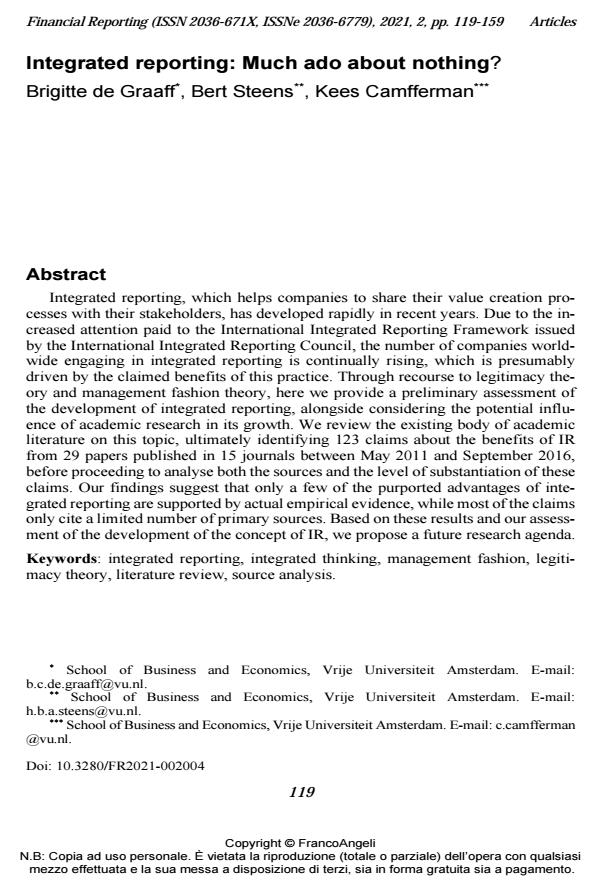Integrated reporting: Much ado about nothing?
Titolo Rivista FINANCIAL REPORTING
Autori/Curatori Brigitte de Graaff, Bert Steens, Kees Camfferman
Anno di pubblicazione 2021 Fascicolo 2021/2
Lingua Inglese Numero pagine 42 P. 119-160 Dimensione file 829 KB
DOI 10.3280/FR2021-002004
Il DOI è il codice a barre della proprietà intellettuale: per saperne di più
clicca qui
Qui sotto puoi vedere in anteprima la prima pagina di questo articolo.
Se questo articolo ti interessa, lo puoi acquistare (e scaricare in formato pdf) seguendo le facili indicazioni per acquistare il download credit. Acquista Download Credits per scaricare questo Articolo in formato PDF

FrancoAngeli è membro della Publishers International Linking Association, Inc (PILA), associazione indipendente e non profit per facilitare (attraverso i servizi tecnologici implementati da CrossRef.org) l’accesso degli studiosi ai contenuti digitali nelle pubblicazioni professionali e scientifiche.
Integrated reporting, which helps companies to share their value creation pro-cesses with their stakeholders, has developed rapidly in recent years. Due to the increased attention paid to the International Integrated Reporting Framework is-sued by the International Integrated Reporting Council, the number of companies worldwide engaging in integrated reporting is continually rising, which is presuma-bly driven by the claimed benefits of this practice. Through recourse to legitimacy theory and management fashion theory, here we provide a preliminary assessment of the development of integrated reporting, alongside considering the potential in-fluence of academic research in its growth. We review the existing body of aca-demic literature on this topic, ultimately identifying 123 claims about the benefits of IR from 29 papers published in 15 journals between May 2011 and September 2016, before proceeding to analyse both the sources and the level of substantia-tion of these claims. Our findings suggest that only a few of the purported ad-vantages of integrated reporting are supported by actual empirical evidence, while most of the claims only cite a limited number of primary sources. Based on these results and our assessment of the development of the concept of IR, we propose a future research agenda.
Parole chiave:integrated reporting, integrated thinking, management fashion, legiti-macy theory, literature review, source analysis.
- Differences in Disclosure of Integrated Reports at Energy and Non-Energy Companies Maja Piesiewicz, Marlena Ciechan-Kujawa, Paweł Kufel, in Energies /2021 pp.1253
DOI: 10.3390/en14051253 - Integrated Reporting and the experience of the Pilot Programme: perspective of an Italian pioneer company over ten years Palmira Piedepalumbo, Ludovica Evangelista, Daniela Mancini, Elisabetta Magnaghi, in Journal of Accounting & Organizational Change /2025 pp.143
DOI: 10.1108/JAOC-04-2023-0074
Brigitte de Graaff, Bert Steens, Kees Camfferman, Integrated reporting: Much ado about nothing? in "FINANCIAL REPORTING" 2/2021, pp 119-160, DOI: 10.3280/FR2021-002004